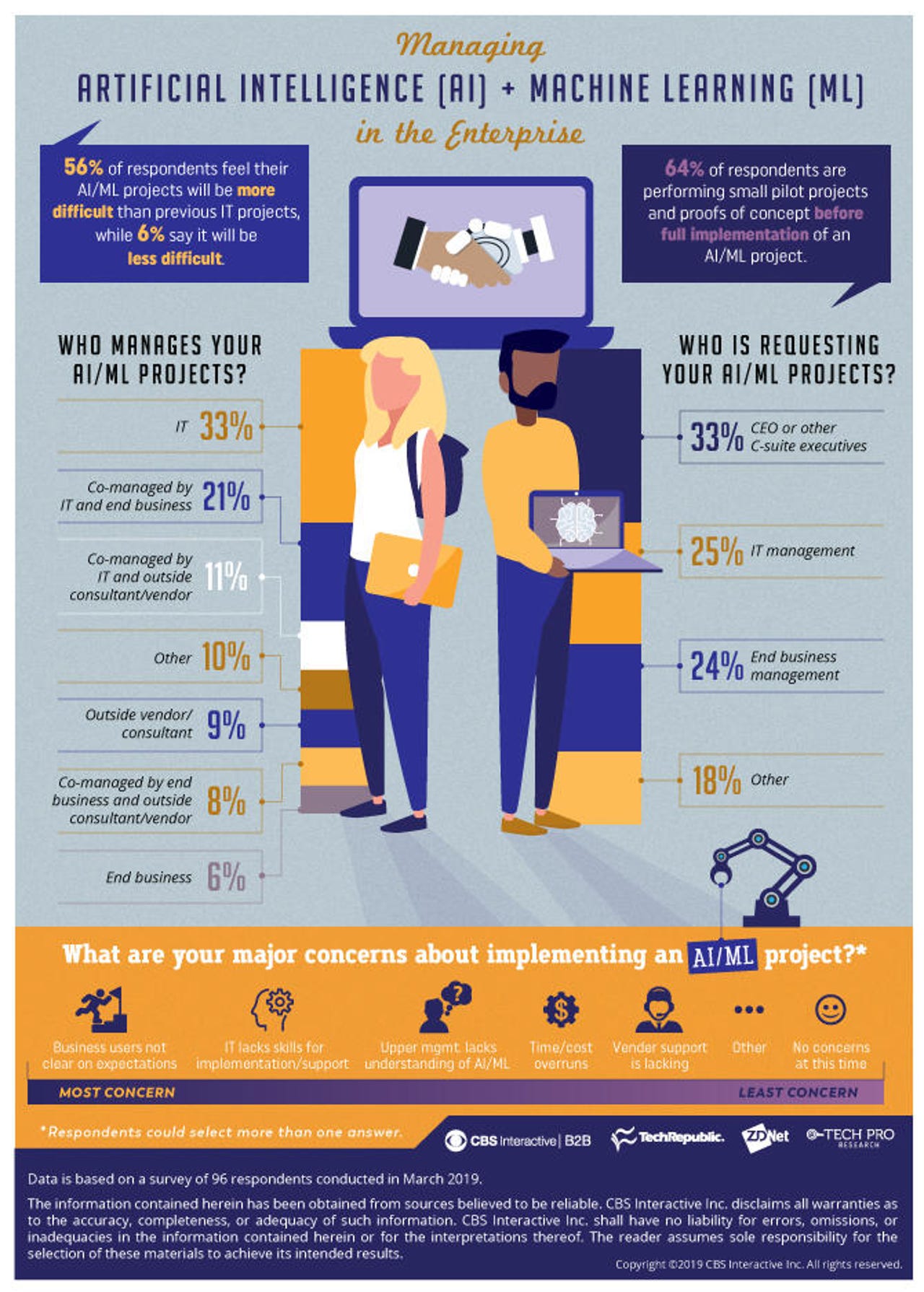AI, cybersecurity, programming languages, smart speakers, and more: Research round-up


Tech leaders cautiously approach artificial intelligence
Let's start with enthusiasm for artificial intelligence (AI) and machine learning (ML), which our special report suggests remains steady for 2019. However, tech leaders admit some trepidation in terms of project management and support, according to a recent survey by ZDNet's premium sister site, Tech Pro Research.
For more see: Survey: Tech leaders cautiously approach artificial intelligence and machine learning projects
Enterprise AI in 2019: What you need to know
The special report finds that while AI hype is significant, the reality is many businesses are a long way from implementing a machine-learning powered system in production. A survey for the O'Reilly AI Adoption in the Enterprise report found that just under 75 percent of respondents said their business was either evaluating AI or not yet using AI.
For more see: Enterprise AI in 2019: What you need to know
AI funding over time by category
Machine learning has seen massive increases in funding, from around $4 billion in 2016 to around $15 billion in 2018. Computer vision categories also grew rapidly, from around $1 billion in 2016 to around $8 billion in 2018. Other AI categories, such as smart robots, natural-language processing, and recommendation engines, also experienced large funding growth in 2017 and 2018.
For more see: Three drivers of AI's explosive startup funding growth
This is how firms are spending their security budget this year
Spending on security hardware, software, and services in Europe could reach $27.3bn this year, driven by new security threats, a lack of skilled staff, and GDPR and other compliance requirements. Spending on security technology is likely to keep the same pace over the next few years to reach a total of $33.6bn by 2022, according to tech analyst IDC.
For more see: Cybersecurity: This is how firms are spending their budget this year
Phishing attacks are a security nightmare
Phishing and fake emails are the biggest security headache for business and amongst the hardest to tackle. According to the 2019 Cyber Security Breaches Survey published by the UK government, the most common type of cyberattacks are phishing attacks, whether through fraudulent emails or being directed to fake websites.
For more see: Phishing attacks are a worse security nightmare than ransomware or hacking
Click fraud apps double malware install rate on Google Play
Google has revealed that malware installed from Google Play grew by 100 percent last year. But the company says the main reason for the growth is that for the first time its definition of "potentially harmful apps" (PHAs) now includes click-fraud apps. Due to the inclusion of click-fraud apps – aka adware – the PHA install rate grew from 0.02 percent in 2017 to 0.04 percent last year.
For more see: Malware in Google Play doubled in 2018 because of click-fraud apps
Developers reveal most loved languages, most loathed, what pays best
Developer knowledge-sharing site Stack Overflow has released its 2019 annual developer survey, revealing the most popular programming languages and which languages are linked to the highest salaries worldwide and in the US. If you're a programmer who loves Rust, Python, and TypeScript, you're not alone, according to Stack Overflow's 2019 survey.
For more see: Programming languages: Developers reveal most loved, most loathed, what pays best
Python developers now outnumber Java ones
Python's rise among developers around the world has been documented by several well-known programming-language indexes. According to SlashData, there are now 8.2 million developers in the world who code using Python and that population is now larger than those who build in Java, who number 7.6 million. Last September, there were seven million Python developers and 7.1 million Java developers.
For more see: Programming languages: Python developers now outnumber Java ones
C++ bounces back at Python's expense
But it's not all good news for Python. There appears to be a resurgence in interest in 35-year-old programming language C++, which has risen to third place in Tiobe's index for April 2019. C++ was created in 1985 as an extension of C and the latest standardized version, C++17, has support from a range of major C++ compilers, including Microsoft Visual Studio, GNU Compiler Collection (GCC), and Clang.
For more see: Programming language popularity: C++ bounces back at Python's expense
PowerShell usage: Windows versus Linux
Other language are on the march upwards, too. Linux usage of PowerShell is the key reason Microsoft's programming language for the first time this March reached 45 in Tiobe's programming-language popularity index. However, Windows usage of PowerShell Core has been flat, representing less than 20 percent of about 11 million PowerShell startups today.
For more see: Microsoft revamps programming language PowerShell as Windows 10 use trails Linux
Microsoft: FCC overstating how many Americans have broadband
According to Federal Communications Commission chairman Ajit Pai, the FCC's current strategy has done wonders for closing the digital divide. But Microsoft has added its voice to those challenging the accuracy of the FCC's broadband claims. Rather than 25 million people without broadband, Microsoft's research indicates "162.8 million people are not using the internet at broadband speeds".
For more see: Microsoft: FCC massively overstating how many Americans have broadband access
Soon smart speakers will outnumber tablets
Finally, the number of smart speakers in homes and businesses will almost double this year, and within a couple of years these chatty new devices will likely outnumber our former gadget of choice, the tablet. There will be roughly 208 million smart speakers, like Amazon's Echo and Google Home, in use around the world by the end of this year, up from 114 million last year (82.4% growth), according to a forecast from Canalys.
For more see: End of an era: Soon smart speakers will outnumber tablets